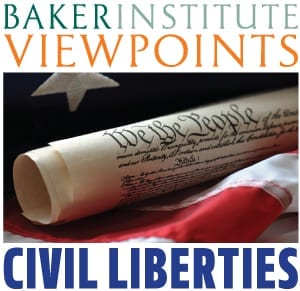 Legal scholars, activists, academics and law enforcement have all questioned the impact of the drug war on civil liberties. Many argue that like the prohibition of alcohol, the drug war has damaged civil liberties, particularly in the areas of search and seizure and the right to privacy. These issues could not be more timely given the changing landscape of drug policy in America. Pew and Gallup polls have indicated, for the first time, that a majority of Americans believe that marijuana should be legal. This sea change in public opinion is no doubt related to medical marijuana laws in 18 states and the District of Columbia and the legalization of marijuana for recreational uses by popular referendums in Colorado and Washington.
Legal scholars, activists, academics and law enforcement have all questioned the impact of the drug war on civil liberties. Many argue that like the prohibition of alcohol, the drug war has damaged civil liberties, particularly in the areas of search and seizure and the right to privacy. These issues could not be more timely given the changing landscape of drug policy in America. Pew and Gallup polls have indicated, for the first time, that a majority of Americans believe that marijuana should be legal. This sea change in public opinion is no doubt related to medical marijuana laws in 18 states and the District of Columbia and the legalization of marijuana for recreational uses by popular referendums in Colorado and Washington.
In this four-day installment of Baker Institute Viewpoints, we ask: Will legalizing marijuana improve civil liberties?
The crime of marijuana possession is, in theory, no different than any other crime in relation to its impact on civil liberties. Law is a reflection of societal norms and values, and when society chooses to criminalize conduct, the investigation and prosecution of those laws are regulated by the Bill of Rights, state constitutions, and numerous statutes and policies applicable to the exercise of government power. If we presume that law enforcement agents act in good faith, that prosecutors exercise their enormous discretion rationally and fairly, and that juries perform their historic role as a check on government overreach, then marijuana legalization should have a neutral impact on civil liberties. Reality, however, is rarely in symmetry with aspiration.
Understanding the potential civil liberties impact on legalization of marijuana requires consideration of a broader range of legal principles related to criminal investigations. The Fourth Amendment prohibits police from conducting “unreasonable” searches or seizures. A search occurs whenever police “look” into an area that a person has taken measures to conceal from the public eye, such as a pocketbook, backpack, briefcase or even pants pocket. A seizure occurs whenever police, through an assertion of authority or an application of force, prevent a person from just walking away. In practice, the range of police searches and seizures is quite broad. The Constitution does not, however, always require a warrant or even probable cause (a practical, fair probability evidence will be found) to justify a search or seizure. Instead, the police conduct must qualify as “reasonable” within the meaning of the law.
It is never reasonable for police to search or seize based on a hunch, or an “instinct” they will find evidence or expose a crime. Our courts have always held that this justification is simply too subjective, and allowing police to act based on such subjective suspicion alone would encourage arbitrary enforcement of the law and unreviewable exercises of police discretion. However, there are numerous situations where a police search or seizure is considered reasonable even without a warrant or probable cause.
One of the most commonly relied upon situations to establish the reasonableness of a search is what is known as a “search incident to arrest.” In order to protect police officers from the risk that someone they arrest might possess a hidden weapon, and to protect hidden evidence from destruction, it is considered reasonable for police to conduct a full search of anyone they lawfully arrest. That allows a search of the suspect’s person and of any containers or areas within the suspects’ “lunging distance.” Such a search is reasonable even when police don’t have even the slightest suspicion the suspect is armed, or that he is concealing evidence. Nor must the search be in any way related to the offense of arrest. All that matters is that the suspect was lawfully arrested. At that point, this full-blown search is automatic, and any evidence discovered during the course of the search is admissible against the suspect.
Critics of the search incident to arrest rule have always argued that it encourages so called “subterfuge arrests” — searches resulting from an arrest made not because the officer was genuinely interested in arresting the suspect, but because the officer had a hunch he might find unrelated evidence by searching the suspect but could not do so without conducting the arrest. Thus, the arrest is really a subterfuge to conduct an otherwise unlawful search. The Supreme Court has, however, consistently rejected a limitation on this search authority based on an illicit subjective motive for the arrest. As a result, even if a police officer admits he arrested a suspect for an extremely minor offense because what he really wanted to do was a search that he could not do absent the arrest, that search will be considered reasonable and evidence discovered admissible so long as the officer had probable cause for the arrest and it was an offense for which arrest was authorized by law.
Possession of marijuana is an arrestable offense in almost all U.S. jurisdictions, and probable cause of marijuana possession is normally easily established by the smell of the substance or by the suspect’s own admission that he is in possession. It is therefore easy to see why this search incident to arrest doctrine, when coupled with the criminal nature of marijuana possession, leads many critics to believe legalization would enhance civil liberties. Quite simply, legalizing possession of marijuana would nullify the utility of possession-based arrests as a subterfuge to engage in searches wholly unrelated to the possession that would be otherwise impermissible.
Our civil liberties are protected when the government complies with the law in the investigation, prosecution and punishment for crime. Assuming law enforcement agents act in good faith and follow both the letter and spirit of the law, the decriminalization of marijuana should have no appreciable impact on these liberties. However, the proclivity of citizens who choose to ignore the law by possessing marijuana, the ease with which probable cause to arrest is established by the odor of marijuana, and the broad scope of the automatic search authority triggered by arrest for marijuana possession all combine to create a genuine risk that many citizens are subjected to what would otherwise amount to unreasonable searches based on marijuana possession. Decriminalization would eliminate this risk and prevent what many believe are subterfuge arrests motivated by the desire to search an otherwise unsearchable suspect. It is therefore easy to understand why so many of our fellow citizens believe such a move would substantially improve our collective civil liberties.
 Geoffrey S. Corn is a professor at the South Texas College of Law, where he specializes in criminal, military, national security and public international law. A retired U.S. Army lieutenant colonel, Corn has been named the law school’s professor and adviser of the year each year since 2008. His work has been published in journals ranging the Stanford Law and Political Review to the Journal of International and Humanitarian Legal Studies. He is the editor and lead author of a forthcoming book from Oxford University Press on “The Law of Military Operations.”
Geoffrey S. Corn is a professor at the South Texas College of Law, where he specializes in criminal, military, national security and public international law. A retired U.S. Army lieutenant colonel, Corn has been named the law school’s professor and adviser of the year each year since 2008. His work has been published in journals ranging the Stanford Law and Political Review to the Journal of International and Humanitarian Legal Studies. He is the editor and lead author of a forthcoming book from Oxford University Press on “The Law of Military Operations.”